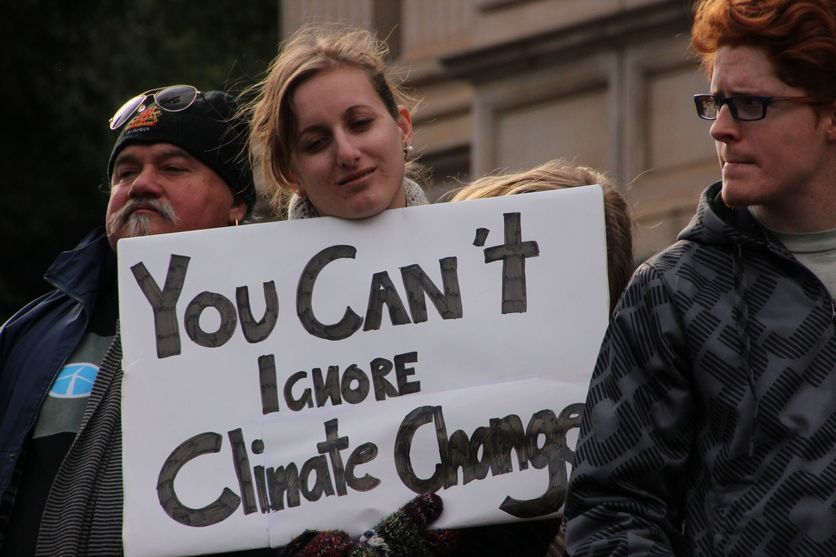The United Nations Climate Change Conference (COP26) is currently underway in Glasgow from 31 October – 12 November 2021. The 26th United Nations Climate Change conference goal is to bring parties from around the world together to accelerate action towards the goals of the Paris Agreement and the UN Framework Convention on Climate Change.
2022 update for COP27
COP27 is being held in Egypt in November 2022. See our latest article Climate change resources to support COP27.
For a short introduction to the conference, see the Seven things to know about COP 26: A quick guide for education unionists from Education International.
Science Learning Hub resources
We have LOTS of resources on the science of climate change and climate change education! Sometimes it can be difficult to know where to begin, so we recommend starting with Climate change resources – planning pathways. It groups Hub resources into key science and teaching concepts like evidence and models and sea level rise.
Our atmosphere and climate – introduction resources focus on climate change with an eye on data and evidence and includes a mātauranga Māori lens. Dairy innovations – targeting climate change features innovative research projects aimed at reducing greenhouse gas emissions associated with dairy farming.
If you want more, see the wide range of resources under our climate change topic – a reminder that you can use the filters, for example to just see activities suitable for secondary level.
Curated collections
Another way to see our climate change content is via one of these curated collections, below :
- Climate change (Focuses on the science of climate change and associated socio-scientific issues – including melting ice and sea level rise.)
- Climate change (HoS) (This collection supports the House of Science Climate Change Kit – but it is also useful for anyone exploring what is climate change, ocean acidification, sea and land water, how climate change affects Māori, the Earth's interacting systems and ideas to tackle these wicked problems in the classroom.)
- Our atmosphere and climate 2020 (The Our Atmosphere and Climate 2020 report was released to all New Zealanders in October 2020. In collaboration with the Ministry for the Environment and Stats NZ we developed a suite of teaching and learning resources around this important report.)
For more on using our Collection tool, including tips on making one of these collections your own to amend to your own needs, collaborate with and more, see our article Creating collections.
We have also curated a wide range of supporting resources in this Climate change Pinterest board.
Listening to scientists
Having information from the experts is important and we have a wide range of videos on climate change – these are a great way for students to hear from scientists. For example, listen to Professor James Renwick in What can I do to stop climate change and Dr Shaun Awatere in The impact of climate change and mātauranga Māori.
These two articles have lots of helpful tips about using our videos in the classroom: Scientists talking to students through videos and Communicating with scientists – interview techniques and protocols.
Other resources/contacts
There are a wide range of organisations working to help our planet, below are just a few New Zealand educators might find useful
If you use Facebook, there are these groups:
- Climate action for educators - Mātauranga Māui
- The New Zealand Association for Environmental Education.
The Ministry for the Environment has lots of information and useful tips for term 4. You could encourage your students to put in a submission to the Emissions reduction plan
Events
Look out for events, such as these current events (note that these events have now expired):
- UN Climate Change Conference COP26 (31 October – 12 November) throughout COP26 the University of Waikato is running a free online event. There is a wide range of topics, bringing together local climate change leaders and advocates from academia, government, the community, iwi, grassroots organisations and business to reflect on the themes and concerns emerging from COP26.
- There are two online United Nations Climate Change Conference (COP26) (4 and 6 November) events from Glasgow.
- NZAEE webinar this Thursday (4pm, 4 November) on how partnerships with external experts can provide inspiration and support and help make community connections.
Other contacts
Below are just a few other New Zealand organisations that have information on climate change. Some may have a scientist that could be available for an interview by your students.
- Ministry for the Environment
- NIWA
- Manaaki Whenua – Landcare Research
- Department of Conservation (DOC)
- Most universities: i.e. He Kaupapa Hononga at Otago University, The New Zealand Climate Change Research Institute (NZCCRI) at Victoria University, Waikato University launched the world’s first Bachelor of Climate Change degree.
- Local councils – see how climate change might impact you.
- Volunteer agencies like Forest and Bird often have knowledgeable people, see the list of branches.
See all news


